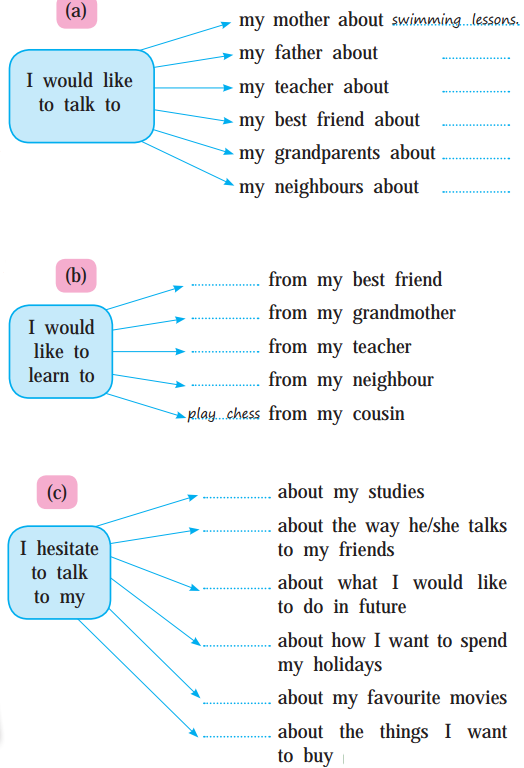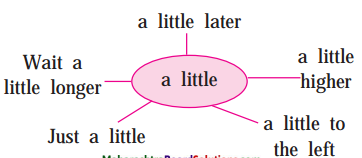Class 9 English Chapter 1.1 Question Answer Maharashtra Board
Balbharti Maharashtra State Board Class 9 English Solutions My English Coursebook Chapter 1.1 Walk a Little Slower Notes, Textbook Exercise Important Questions and Answers.
Walk a Little Slower Poem 9th Std Question Answer
My English Coursebook Std 9 Digest Chapter 1.1 Walk a Little Slower Textbook Questions and Answers
Warming up!
Chit-chat:
Form pairs or groups of four. Use these questions to start a conversation with your friends.
- Are you a talkative person?
- Do you like to share your thoughts?
- What would you like to do after 10th?

My Thoughts:
1. Form groups of 4-6. Discuss the following with your friends in the group and then complete the sentences.
Question 1.
Form groups of 4-6. Discuss the following with your friends in the group and then complete the sentences.

English Workshop:
1. Read the poem aloud.
Question 1.
Read the poem aloud.

2. Put the words given in brackets in the proper blanks.
Question 1.
Put the words given in brackets in the proper blanks.
(a) The ………….. is talking to its . (father/child)
(b) The …………. is leading and the …………. is following. (father/child)
(c) Someday the ……………. will become a ………… (father/child)
(d) The ………….. does not wish to fall while following its …………… (father/child)
Answer:
(a) The
child
is talking to its father. (father/child)
(b) The
father
is leading and the child is following, (father/child)
(c) Someday the
child
will become a
fathe
r. (father/child)
(d) The
child
does not wish to fall while following its
father
. (father/child)

2. Find and write pairs of rhyming words from the poem. (Words that appear at the end of the line.)
Question 1.
Find and write pairs of rhyming words from the poem. (Words that appear at the end of the line.)
Answer:
- small-fall
- see-me.
- be-me
- true-you.

3. The meanings of the words in the following pairs show that they are related

Find five more pairs of related words:
Examples :
- teacher: …………….
- doctor: ………………
- give: ………………….
- ………………………….
- ………………………….
Question 1.
Find five more pairs of related words:
Answer:
- teacher ⇄ student
- doctor ⇄ patient
- give ⇄ take
- owner ⇄ servant
- come ⇄ go.
4. The child in the poem requests his father to walk slower. Here, the poet implies that the child wants to understand his father’s actions better. The child would like to act the same way, but wants the father to be more understanding towards the child’s needs. What is implied in the following lines?
Question a.
Sometimes your steps are very fast…
Answer:
Sometimes the father’s actions are too quick for the child to follow them properly.

Question b.
Sometimes your steps are hard to see …
Answer:
Sometimes the actions of the father are so difficult that the child cannot understand, observe and act accordingly.
Question c.
I would want to lead just right…
Answer:
The child who is grown up now wants to guide his child correctly in the journey of his life.
Question d.
And know that I was true …
Answer:
The grown up child is confident about his opinions, judgements and actions in his life. He was correct and sincere throughout his life like his father.

5. Using your own ideas, frame three sentences that show continuous action.
Example: You are leading me.
Question 1.
Using your own ideas, frame three sentences that show continuous action.
Answer:
- My elder sister was helping me with my studies.
- He is making us laugh.
- Our team players are gaining confidence.
6. Using your own ideas, frame at least three sentences that show future action or state.
Examples:
Who’ll (who will) want to follow me.
When I’m all grown up …
Question 1.
Using your own ideas, frame at least three sentences that show future action or state.
Answer:
- Who will want to participate in the elocution competition?
- When I’m in Std. X.
- They are going to arrive tomorrow.
- I’ll be 16 years old in 2018.

7. Discuss the following and write the summary of your discussion in the form of bullet points.
Question a.
How are certain ideas/customs/knowledge passed on from one generation to the next?
Answer:
- preserved by forefathers and passed on to new generations
- continued to exist till this date
- mythological literature, vedas, folklores, fables and arts instilled cultural values into them
- known to them through celebrations of festival and religious ceremonies
- Every community wants to preserve their cultural heritage because of their conservative mindset

Question b.
Is it necessary for children to follow the footsteps of their forefathers? If yes, why? Why is it sometimes necessary to change the old ways?
Answer:
- Yes, it is necessary to follow the footsteps of our forefathers
- because of its importance in life and the moral values it involves
- Sometimes it is necessary to change the old ways because many of the traditions and customs are based on superstitions which cannot be explained by reason or science
- have to accept good modern ideas
- To safeguard the moral standard of people which is declining everywhere
8. Do you have a role model? What qualities do you appreciate in your role model?
Question 1.
Do you have a role model? What qualities do you appreciate in your role model?
Answer:
My role model is Dr. A.P.J. Abdul Kalam, the former President of India. He was known as the Missile-man – the man behind India’s missile programme. I appreciate his intelligence, dedication to his duty, hard work, serenity and simplicity, his commitment to inspire and guide the youth of India, there was no change in his simplicity, politeness, humility and thoughtfulness even in his capacity as the President.

9. Think of an occasion when you did not like the decision/actions of your family members but realised later on that they were tight. Write about it in 5-8 lines.
Question 1.
Think of an occasion when you did not like the decision/actions of your family members but realised later on that they were tight. Write about it in 5-8 lines.
Answer:
Our class went for a trip to Lonavala. Before going there, all elderly persons warned me not to venture on any risky place especially if it is a river. At Lonavala, we saw a big river. All students were enjoying on the bank of the river. Some started swimming in it. I also tried to enter the river but suddenly slipped and fell into the river. I did not know swimming. I began to drown. I was terrified and cried for help. One of our teachers knew swimming. He boldly jumped into the river.
He swam towards me and holding my hand firmly brought me to the bank of river. I lay unconscious. Water in my stomach was removed. I felt a little better but could not enjoy the picnic anymore. The dangerous situation taught me the lesson of a life time. I realised that my family was right and decided never to disregard my parent’s advice.

10. Within two minutes, write as many phrases or sentences as you can using ‘a little’.

Question 1.
Within two minutes, write as many phrases or sentences as you can using ‘a little’.
Answer:
- a little while.
- I need a little more time.
- Move a little forward.
- a little earlier.
- a little smaller.
- You just need a little bit of luck.
- a little old lady.
- quite a little milk.
- a little confusion.
- I found him a little smarter.
- a little improved.
My English Coursebook 9th Class Solutions Chapter 1.1 Walk a Little Slower Additional Important Questions and Answers
Read the following extract and do the activities:
Simple Factual Activities:
Question 1.
What would happen if the child tried to walk fast? Why?
Answer:
If the child tried to walk fast he/she will not be able to properly understand the actions, thoughts, etc. of his/her father and will fail to achieve success in life.

Complex Factual Activities:
Question 1.
Does the word ‘walk’ refer only to the act of walking? What does the poet actually mean to say?
Answer:
No, the word ‘walk’ does not refer here only to the act of walking. The poet actually wants to say that the father should communicate his thoughts and feelings to the child and help him/her to learn or become familiar with the ways of life by showing him/her or explaining the child how to behave and act for living a good life.

Question 2.
What do the ‘footsteps’ of the father refer to?
Answer:
The ‘footsteps’ of the father refers here to the father’s mannerisms, distinctive and individual gestures, traits of speaking and behaving, his actions and his all other characteristics that makes a person successful in life.
Question 3.
What qualities of your parents/eiders would you like to adopt?
Answer:
Their ability, noble thoughts and actions, kindness and love for others, discipline, hard work, I honesty, perseverance and to remain happy in good or bad condition.

Appreciation of Poem:
1. Title: ‘Walk a little slower…’
2. Poet/Poetess: The poet is unknown.
3. Theme/Central Idea: The importance of l the father as a role model is the central idea of the poem. The child in the poem wants to observe and imitate the life led by his/her father. Hence the I child requests the father to be more considerate towards his/her needs.
4. Rhyme Scheme: The rhyme scheme of the stanzas is ‘abeb’.
5. Figure of Speech: Alliteration and metaphor
6. Special Features: This poem is a dramatic monologue. Dramatic monologue is a kind of poem in which the speech does not reveal the poet’s own thoughts. Instead, the thoughts of the character speaking are expressed.
7. Favourite Lines: My favourite lines from the poem are:
“I’m following in your footsteps And I don’t want to fall.”
Then I will have a little child Who’ll want to follow me.
8. Why I like the poem: I like this poem for its sheer simplicity. There is not a single difficult word in the poem. This helps me understand the poem fully. Even the implied meanings are easy to guess.